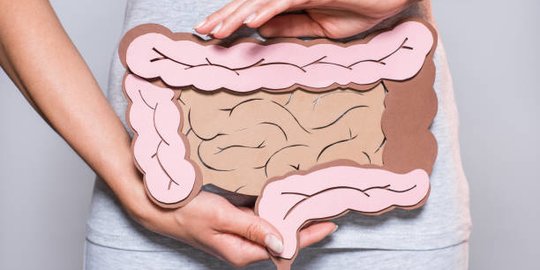digestive illustration. isstockphoto.com
–
Merdeka.com – In normal digestion, the food particles we digest will pass through intestine 25 feet or more in length. And the digested waste will continue to move in this process.
However, there are conditions that can hinder this process. This blockage condition is known as intestinal obstruction, which occurs when the small or large intestine is blocked. This blockage can be partial or complete and can prevent the passage of liquids and food.
–
If intestinal obstruction occurs, there will be a buildup behind the blockage site. This buildup can consist of food, liquids, stomach acid, or gas. If the pressure increases, your intestines can rupture, losing intestinal contents and harmful bacteria in the abdominal cavity. This is a life-threatening complication.
There are many potential causes of intestinal obstruction. In most cases, this condition cannot be prevented. Untreated bowel obstruction can be fatal. Therefore it is important to know the cause bowel obstruction along with symptoms.
2 of 4 pages
–
Causes of intestinal obstruction
The obstruction can be a partial condition, which can improve without surgery. While complete blockade may require surgery. Quoted from the Healthline page, here are the causes of intestinal obstruction by type.
Causes of mechanical intestinal obstruction
Mechanical obstruction is when something physically blocks your intestines. In the small intestine, mechanical intestinal obstruction can be caused by:
- adhesions, which are made up of fibrous tissue that can develop after abdominal or pelvic surgery or after severe inflammation
- volvulus, or twisted intestine
- intussusception, a condition in which the intestine folds or slips into another part of the intestine
- Bowel malformations, common in infants, but can also occur in children and adolescents
- tumors in the small intestine
- gallstones, although they rarely cause obstruction
- ingested objects, especially in children
- hernia, which involves a part of the intestine that pushes out of the muscles or tissues of the body or into another part of the body
- inflammatory bowel disease, such as Crohn’s disease
Although rare, mechanical obstruction can also block the colon. The causes of mechanical intestinal obstruction in the large intestine are caused by:
- stools blocked in the colon or rectum
- adhesions due to pelvic infections or surgery
- ovarian cancer
- colon cancer
- meconium plugs in infants (meconium is the baby’s stool that is passed for the first time)
- volvulus and intussusception
- diverticulitis, inflammation or infection of the protruding pouch of the intestine
- stricture, a narrowing of the large intestine caused by scar tissue or inflammation
Non-mechanical causes of intestinal obstruction
Your small and large intestines normally work in a coordinated system of movements. If anything interferes with these coordinated contractions, it can cause functional bowel obstruction.
This condition is commonly known as non-mechanical obstruction. If it’s just a temporary condition, it’s called ileus. And if it turns into a chronic or long-term condition, it’s called pseudo-obstruction.
Causes of ileus include:
- abdominal or pelvic surgery
- infections, such as gastroenteritis or appendicitis
- some medications, including opioid pain medications
- electrolyte imbalance
While intestinal pseudo-obstruction can be caused by:
- Parkinson’s disease, multiple sclerosis and other nerve and muscle disorders
- Hirschsprung’s disease, a disorder in which there is a lack of nerves in the large intestine
- disorders that cause nerve damage, such as diabetes mellitus
- hypothyroidism or underactive thyroid
3 of 4 pages
–
Symptoms of intestinal obstruction
Bowel obstruction can cause a variety of symptoms, such as:
- severe swelling
- stomach ache
- decreased appetite
- sickening
- He retched
- inability to pass gas or stool
- constipation
- diarrhea
- severe stomach cramps
- abdominal bloating
Some of the symptoms may depend on the location and duration of the obstruction. For example, vomiting is an early sign of small bowel obstruction. Vomiting can also occur with colonic obstruction if it persists.
Partial obstruction can cause diarrhea, while complete obstruction can prevent you from having a bowel movement.
Bowel obstruction can also cause severe infections and inflammation of the abdominal cavity, known as peritonitis. This condition occurs when part of the intestine breaks down. This causes a fever and can trigger an upset stomach. This condition is a life-threatening emergency and requires surgery.
4 of 4 pages
–
Treatment of intestinal obstruction
Treatment of intestinal obstruction will depend on the location and severity of the obstruction. Don’t try to fix it yourself at home. Appropriate treatment depends on the type of intestinal obstruction.
For partial obstruction or ileus, it can be done by simply resting the intestines and taking intravenous (IV) fluids. Resting the gut means that you will not eat and only consume clear liquids during that time. If the cause of the obstruction is known, your doctor will treat it.
Treating dehydration is also important. A doctor can give you intravenous fluids to correct an electrolyte imbalance. A catheter can be inserted into the bladder to drain urine.
You may need to insert a tube through your nose and down your throat, stomach, and intestines to relieve pressure, swelling, and vomiting.
If your problem is caused by the use of narcotic pain medications, your doctor may prescribe medications that reduce the effects of narcotics on the gut.
Surgery will be needed if these measures fail or if symptoms worsen. Treatment in these cases usually requires hospitalization. You will be given intravenous fluids, because in addition to relieving dehydration, they help prevent shock during surgery.
A serious complication of a bowel obstruction can be permanent damage to the bowel. If this happens, the surgeon will perform surgery to remove the piece of tissue that has died and reattach the healthy ends of the intestine.
Although prescription medications cannot treat the obstruction itself, they can help reduce nausea until further treatment is given.
You shouldn’t ignore the symptoms of intestinal obstruction or try to cure intestinal obstruction on your own at home.
[ank]–
–


